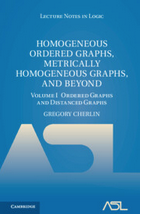Homogenous Ordered Graphs, Metrically Homogenous Graphs, and Beyond: Volume 1, Ordered Graphs and Distanced Graphs
Gregory Cherlin

Year: 2022
ISBN: 9781009229692
386 pages, Hardcover
Buy now (when ordering, include the discount code ASL25 to receive the 25% ASL member discount). You can also purchase the multiple copy pack of both volumes in this set at a reduced price.
This is the first of two volumes by Professor Cherlin presenting the state of the art in the classification of homogeneous structures in binary languages and related problems in the intersection of model theory and combinatorics. Researchers and graduate students in the area will find in these volumes many far-reaching results and interesting new research directions to pursue. In this volume, Cherlin develops a complete classification of homogeneous ordered graphs and provides a full proof. He then proposes a new family of metrically homogeneous graphs, a weakening of the usual homogeneity condition. A general classification conjecture is presented, together with general structure theory and applications to a general classification conjecture for such graphs. It also includes introductory chapters giving an overview of the results and methods of both volumes, and an appendix surveying recent developments in the area. An extensive accompanying bibliography of related literature, organized by topic, is available online.
Table of Contents
1. Results
2. Methods
Part I. Homogeneous Ordered Graphs:
3. The catalog of homogeneous ordered graphs
4. The generically ordered local order
5. Ordered homogeneous graphs: Plan of the proof, Propositions I–IX
6. Ordered homogeneous graphs: Proposition I
7. Ordered homogeneous graphs: Proposition II
8. Ordered homogeneous graphs: Proposition III
9. Ordered homogeneous graphs: Proposition IV
10. Ordered homogeneous graphs: Proposition V
Part II. Metrically Homogeneous Graphs:
11. Metrically homogeneous graphs: preliminaries
12. Admissibility allows amalgamation
13. Triangle constraints and 4-triviality
14. Amalgamation requires admissibility
15. Local analysis
16. The bipartite case
17. Infinite diameter
Appendix A. Some recent advances
References for Volume I
Index